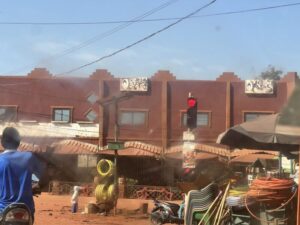The once-bustling Damaturu Grain Market is now a shadow of its former self, as the poor condition of access roads has forced traders to threaten a boycott. The dirt roads leading to the market, rendered nearly impassable by recent heavy rains, are riddled with deep potholes, thick mud, and stagnant water-filled gutters. Traders, who are primarily grain sellers and commodity dealers, have expressed growing frustration with the state government’s failure to repair the roads, which they claim has led to a significant downturn in business.
One of the grain sellers, 48-year-old Musa Gambo, lamented the dire situation, saying, “For years, we’ve pleaded with the government to fix these roads, but our cries fall on deaf ears. Now, after every rainfall, the roads turn into a swamp. No vehicle can move, no customer can reach us, and we lose money every day.”
The traders, visibly upset, are no longer willing to endure the hardship. Adamu Shettima, a 35-year-old dealer, voiced his concern, saying, “We are tired of the empty promises. Many of us have families to feed. If the roads are not repaired, we will stop bringing our goods here. What’s the point if customers can’t even access the market?”
The ripple effects of the deteriorating market infrastructure extend beyond the traders themselves. Local economic analysts estimate that the Damaturu Grain Market, once a vital revenue generator for the Damaturu Local Government Council, has seen a 30% drop in its revenue over the past two years due to the failing road network. This decline has affected the council’s internally generated revenue, a critical financial stream for local development.
Government officials, however, remain silent on the issue, even as the traders’ strike looms large. One market representative noted that local authorities had previously promised to address the situation but so far, no concrete action has been taken. According to figures by a Damaturu economic analyst who preferred anonymity, the market generates about₦200 million annually, with projections that this could rise by 50% if adequate infrastructure is provided.
This predicament comes at a time when Yobe State Governor, Mai Mala Buni, has been praised for his ambitious plans of constructing new, modern markets across seven major towns, including Damaturu, Potiskum, Gashua, Nguru, and Geidam. These projects were launched during his first tenure in 2019 as part of a larger economic initiative aimed at boosting trade and commerce in the state. However, most of these markets remain incomplete or partially completed, raising concerns among both traders and citizens.
In a related development, the Potiskum Trailer Park, which was expected to be a key logistical hub for northern Nigeria, remains abandoned despite the high expectations that accompanied its launch. The park was to serve as a critical stop for trailers, truckers and traders transporting large goods across the Sahel, but it has seen unsatisfactory progress since work began. A similar fate has befallen the other market projects, with completion dates repeatedly pushed back due to alleged funding challenges and bureaucratic delays.
In an interview with Ibrahim Nakowa, a 55-year-old grain merchant from Potiskum, he expressed disappointment over the delay in completing these projects. “Governor Buni started something very good with these modern markets. But now, more than one and a half years into his second term, we still see nothing finished. It is hurting businesses like mine. We need these markets to be completed and operational, not left to waste.”
Despite the governor’s efforts to reposition Yobe State as a hub for commerce, the unfinished projects have led to questions about the effectiveness of the state’s infrastructural development plans. The slow pace of completion has resulted in frustration from the business community, who rely heavily on improved market infrastructure to grow their enterprises.
The grain market crisis is emblematic of larger concerns about infrastructure development in Yobe State. With traders threatening to stop their business activities, the state stands to lose critical revenue unless swift action is taken. The traders, along with concerned citizens of Damaturu, have called on the state government to urgently address the market’s deplorable conditions and resume work on the new, promised markets.
“We are not asking for too much,” added Musa Gambo. “We just need good roads to access the market and the completion of these projects that were promised to us. It’s the least we deserve.”
The ball is now in the court of Governor Mai Mala Buni and his administration. Traders and citizens alike are watching closely, hoping that their voices will finally be heard and that action will be taken to restore Damaturu Grain Market and complete the new market projects that have long been delayed.



